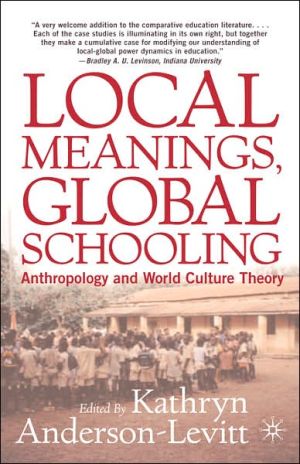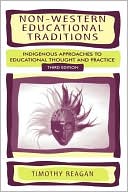Local Meanings, Global Schooling
These case studies from five continents use ethnography and history to challenge the sweeping claims of sociology’s world culture theory (neo-institutionalism). They demonstrate how national ministries of education and local schools re-invent every reform. Yet the cases also show that teachers and local reformers operate “within and against” global models.
Search in google:
These case studies from five continents use ethnography and history to challenge the sweeping claims of sociology’s world culture theory (neo-institutionalism). They demonstrate how national ministries of education and local schools re-invent every reform. Yet the cases also show that teachers and local reformers operate “within and against” global models.
PrefaceA World Culture of Schooling?11"Thai Wisdom" and GloCalization: Negotiating the Global and the Local in Thailand's National Education Reform272Transformations in South Africa: Policies and Practices from Ministry to Classroom513Teaching by the Book in Guinea754Beyond the "One Best System"? Developing Alternative Approaches to Instruction in the United States995Resistance to the Communicative Method of Language Instruction within a Progressive Chinese University1216World-Cultural and Anthropological Interpretations of "Choice Programming" in Tanzania1417The Politics of Identity and the Marketization of U.S. Schools: How Local Meanings Mediate Global Struggles1618World Culture or Transnational Project? Competing Educational Projects in Brazil1839Europeanization and French Primary Education: Local Implications of Supranational Policies20110Transforming the Culture of Scientific Education in Israel219The Global Model and National Legacies239List of Contributors255Index259
\ From the Publisher\ "Anderson-Levitt has brought together a rich array of authors and case studies to show how globalizing trends and policies (such as standardized testing, or teacher autonomy) are appropriated and incorporated into the lived lives of schooling. The book is a model of scholarly engagement; it eschews polemic for a nuanced, yet critical interrogation of world culture theory's central postulates. The inclusion of an incisive final commentary by Francisco O. Ramirez, one of this theory's key proponents, attests to this engaged stance. One of the book's particular strengths is the inclusion of France, the United States, and Israel as case studies, rather than perpetuating the typical 'West and the rest' mentality of much work on globalization." --Bradley A. U. Levinson, Indiana University, author of We Are All Equal: Student Culture and Identity at a Mexican Secondary School and editor of Schooling the Symbolic Animal: Social and Cultural Dimensions of Education\ \ \







